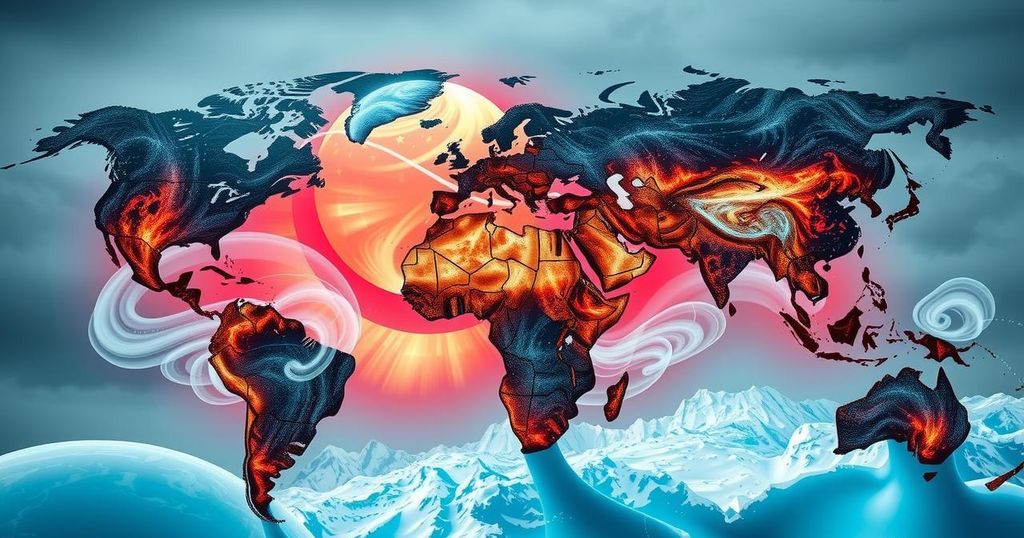2024: A Pivotal Year for Climate Change and Global Response

Climate change has had devastating effects globally in 2024, which is projected to be the hottest year on record, exacerbating extreme weather events. With greenhouse gas levels at a historic high, the need for urgent action to mitigate climate impacts has been emphasized by UN and WMO leaders. Notable initiatives and collaborations are underway to address this escalating crisis, aiming to usher in a more sustainable future.
In 2024, the world experienced severe repercussions from climate change, affecting ecosystems, economies, and communities across the globe. The World Meteorological Organization (WMO) projected that this year would be the hottest on record, continuing a troubling trend of heightened global temperatures over the past decade due to human activity. In response to this crisis, UN Secretary-General António Guterres has emphasized the urgent need for nations to significantly reduce emissions and shift towards renewable energy solutions going forward.
The WMO confirmed that the levels of greenhouse gases have reached unprecedented heights, further exacerbating the Earth’s warming. “Today I can officially report that we have just endured a decade of deadly heat. The top ten hottest years on record have happened in the last ten years, including 2024,” stated UN Secretary-General António Guterres in his New Year message. WMO Secretary-General Celeste Saulo elaborated on the dire situation, underscoring the vital need for immediate action: “WMO marks its 75th anniversary in 2025 and our message will be that if we want a safer planet, we must act now. It’s our responsibility.”
Throughout 2024, extreme weather events became increasingly frequent and severe, with instances of record rainfall, devastating floods, and deadly tropical cyclones impacting various regions, including the French territory of Mayotte. The intensity of heat waves led to record-breaking temperatures surpassing 50 °C in multiple countries, highlighting the immediate dangers posed by climate change.
The WMO’s initiatives, such as the Early Warnings for All initiative, aim to improve climate service development for better adaptation and recovery from such events. Emphasis will be placed on the cryosphere in 2025, coinciding with its designation as the International Year of Glacier Preservation. A recent report from World Weather Attribution demonstrated that climate change worsened 26 out of 29 extreme weather events in 2024, which collectively resulted in over 3,700 fatalities and massive displacement. Reports also indicated that climate change contributed an alarming 41 additional days of extreme heat this year, severely impacting human health and ecosystems.
Addressing the rising risks from extreme heat necessitates international collaboration. A group of experts from various global organizations gathered at the WMO headquarters in December to strategize a coordinated response to this growing threat, aligned with the UN Secretary-General’s call to action on extreme heat. As WMO prepares to commemorate its 75th anniversary, it remains committed to coordinating efforts to monitor climate conditions and facilitate international responses to mitigate climate change effects.
The year 2024 has been marked by alarming climate trends, including unprecedented heat and extreme weather conditions driven by human-induced climate change. The World Meteorological Organization has recognized the growing threat posed by escalating global temperatures and the resultant increase in extreme weather events. Nations worldwide are called to take immediate measures to address emissions and transition to sustainable practices in light of the environmental crisis that has unfolded over the last decade.
In summary, 2024 stands as a critical year in the battle against climate change, revealing the urgent need for immediate international action on emissions reduction and climate adaptation strategies. With rising global temperatures and the increasing frequency of extreme weather events, the WMO will continue to lead efforts aimed at fostering global cooperation to address these challenges effectively. The messages from UN leaders underline the importance of decisive action by nations to ensure a sustainable future for the planet.
Original Source: reliefweb.int






